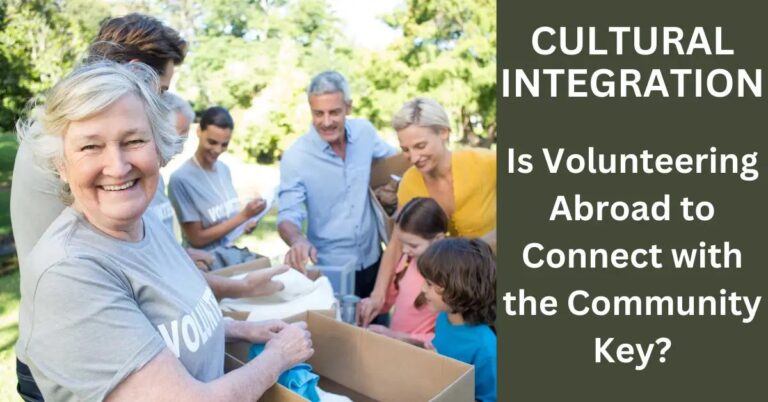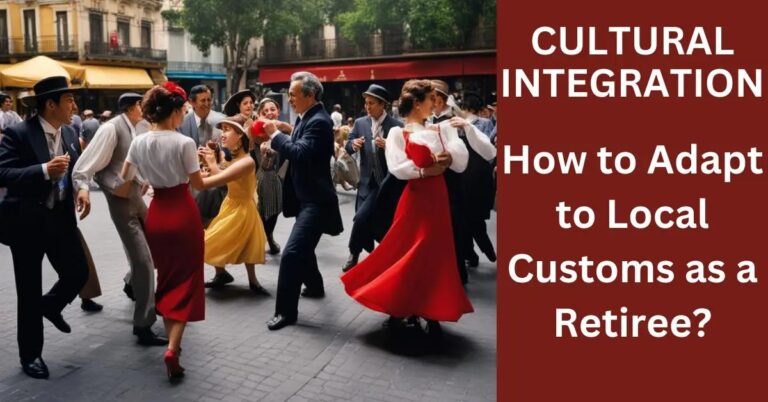TL;DR:
- Understand the stages of culture shock: honeymoon, frustration, adjustment, acceptance.
- Learn local cultural norms via classes or by asking locals; respect new ways while retaining your identity.
- Build a support network by joining local groups or clubs.
- Managing culture shock involves recognizing and addressing stressors, practicing mindfulness, and adjusting expectations.
- Language skills enhance integration; join language exchange programs.
- Participate in community events and adopt local leisure activities.
- Use technology tools for cultural and location navigation.
- Social integration challenges include stereotypes and language barriers.
- Deal with reverse culture shock by balancing old and new cultural practices using expatriate groups and social media.
- Patience and engagement can overcome initial discomfort, making retirement abroad rewarding.
Retiring abroad sounds adventurous, but culture shock can take the fun out fast. Understanding its four stages—honeymoon, frustration, adjustment, acceptance—helps stop that. Discover ways to respect cultural norms without losing yourself. Build ties with locals to tackle loneliness. Learn stress management to ease anxiety. Embrace new experiences by engaging with community events. Ready to thrive in your new home? Let's explore these strategies together!
How Can Retirees Adapt to Cultural Differences?
When you retire abroad, culture shock can be real. So, how do you overcome culture shock? The trick is understanding the four stages of culture shock: honeymoon, frustration, adjustment, and acceptance. First, you feel excited about the new place. Then, small things like asking for directions can stress you out. Slowly, you'll start adjusting to new norms and finally, everything feels normal again.
Understanding cultural norms in retirement is key to adapting. Different countries have different ways people greet, eat, and treat guests. Asking locals or taking cultural classes can help you learn these norms. Respect is important, but so is staying true to who you are.
Adapting to cultural differences in retirement also means making new friends. It can be lonely when you don't know anyone. Find local groups or clubs to join. If you love reading, find a book club. If you love hiking, join a walking group. Visiting local markets or coffee shops are great for meeting people too.
What are some ways to cope with loneliness abroad? Building connections with others in your new home can help. Talk to your neighbors or join local events to meet people. Sometimes, you might feel isolated. Remember, people are friendly, and many are as curious about you as you are about them.
Recognizing and respecting cultural values is necessary. Yet, you don't have to lose your identity. Share your stories and experiences with others too. Every person's culture adds to the community's richness, including yours.
What Are the Effective Strategies for Managing Culture Shock in Retirement?
To overcome culture shock, manage stressors that arise in a new environment. First, recognize what stresses you, such as language barriers or local customs. Once identified, you can start to address these stressors. Techniques like deep breathing or quiet time can help you relax.
Building a support network is crucial. Connect with people who understand you, such as other expats or local friends. They can offer comfort and advice. Finding a local group, like a club or organization, can provide a sense of belonging.
Explore religious or community groups for support too. These groups often welcome newcomers warmly. They offer social events and gatherings, giving you the chance to make friends and share experiences.
Managing expectations is vital. Understand that change takes time, and you might not grasp everything right away. When you adjust your outlook, the surprise of culture shock lessens. This mindset allows you to embrace new experiences with enthusiasm rather than fear.
Practice mindfulness to keep anxiety low. Focus on the present moment. Observe your new surroundings without judgment. This helps reduce stress, making life in another culture more enjoyable.
Does culture shock ever go away? Yes, it does, but it varies for each person. Many people reach a point where they feel comfortable and at home. You might find that over time, the differences that once seemed strange become normal.
Remember, adapting to a new culture is a journey. With patience and support, you will find your place in this new world. For more information on stress management techniques, you can visit this comprehensive guide on stress management.
How Can Retirees Navigate a New Environment Successfully?
Overcoming culture shock can feel like an adventure. To adapt well, learning the local language is the key. Join language exchange programs. They help you connect and learn in real-life. A few simple phrases can open doors to deeper experiences. You could ask, "How do I interact with locals?" Begin with respect. Start smiling and saying "hello" in their language.
Engaging in community events offers vital insights. Festivals and cultural activities showcase unique traditions. How do you become part of these experiences? Join local clubs or volunteer groups. Helping in small ways boosts belonging.
Finding hobbies that match the local culture adds joy. Explore art, music, or sports. Ask yourself, "What leisure activities fit here?" Participate and witness the richness of diverse settings. It could be dancing at a festival or crafting in a community class.
Technology offers powerful tools for discovery and connection. Apps can locate nearby resources and services. They provide quick help when learning local customs or navigating areas. But which tools help the most? Search for community-based apps with good reviews. They offer insights and support.
A major question may arise: "How do I recover from culture shock?" Patience is crucial. Acknowledge feelings and give yourself time. Embrace the journey of adjustment while being kind to yourself. Explore different ways to immerse yourself and connect with others. Small steps lead to comfort and familiarity.
Remember, overcoming challenges enriches your experience. By taking part in local life fully, you'll find yourself adapting naturally. Joy and acceptance can replace initial discomfort, making your retirement abroad truly rewarding.
What Are the Challenges of Social Integration for Retirees Abroad?
Social integration can be difficult for retirees abroad. First, many face stereotypes or misconceptions. These can make forming friendships or connections harder.
To adapt, balancing your cultural heritage with new local practices is essential. This means enjoying and adopting new traditions while keeping important parts of your own culture.
To communicate well in a new country, refine your language skills. Learning local languages enhances conversations and builds rapport.
How can retirees deal with reverse culture shock? Precision answer: Recognize common signs and apply coping strategies.
Many retirees abroad might experience reverse culture shock. Common signs include feeling out of place, disorientation, and longing for previous routines. To tackle this, first identify your feelings. Understanding these signals is the first step in adapting. Then, try to celebrate your old and new cultures. Engage in traditions from both, and it will help you accept change.
Social media and expatriate groups can bridge old and new experiences. These platforms offer a way to stay connected with those who share similar journeys. Meeting folks who’ve been through the same challenges can be comforting. Expatriate groups are wonderful for finding others with similar interests or backgrounds.
Making friends in retirement requires effort and an open mind. Attend local gatherings and events to meet people. These settings are friendly and open, making friendships likely.
Social integration is like a dance between holding onto your roots and embracing new experiences. By managing misconceptions, balancing cultures, and improving communication, you can enjoy a fulfilling retirement abroad.
For more insights on cultural adaptation, explore our resources on cultural practices and communication.
Conclusion
Understanding culture shock and its stages can ease your path abroad. Embrace local norms, build strong networks, and stay true to yourself. Manage stress by adjusting expectations and seeking support. Dive into local activities and language to really feel at home. Remember, balance is key—blend your culture with the new one. Keep connecting with people to deepen your experience. Retiring abroad offers rich experiences if you're open and adaptable. Your journey is about growth and cultural exchange.












